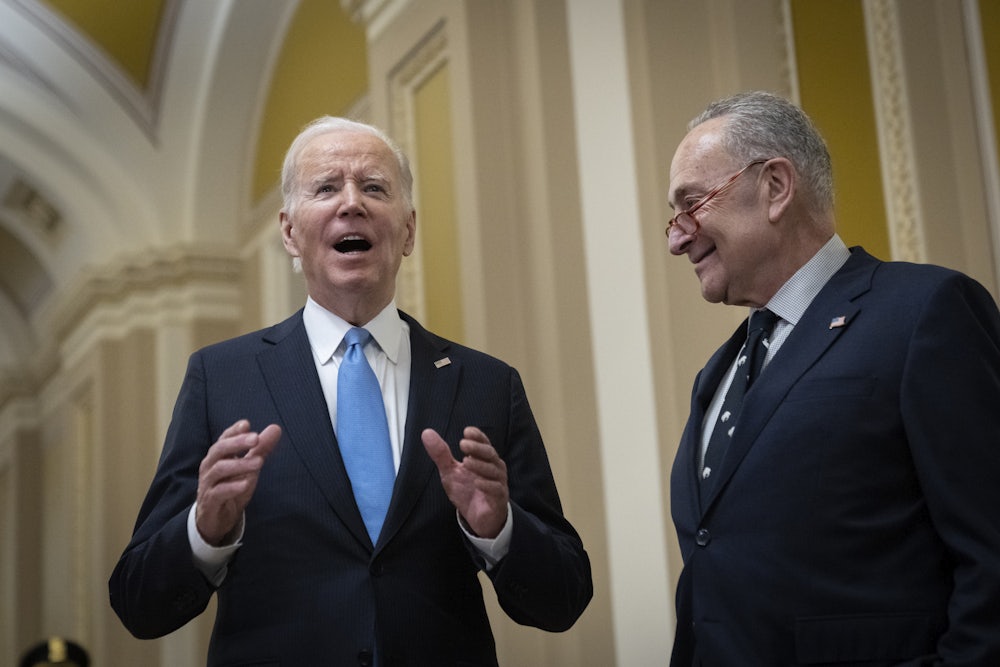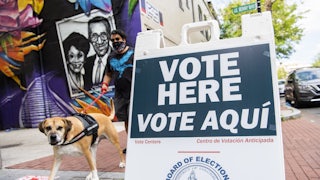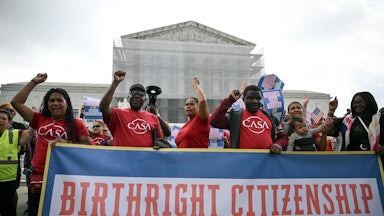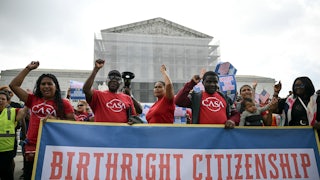The U.S. Senate is expected to vote on Wednesday to override a new District of Columbia law overhauling its 100-year-old criminal code, yet another ignominious maneuver in Congress’s long campaign to deny the right of self-government to nearly 700,000 Americans. This latest blow is a bipartisan one too: President Biden, who had previously threatened to veto a congressional override, changed his tune last week, tweeting, “I support D.C. Statehood and home-rule—but I don’t support some of the changes D.C. Council put forward over the Mayor’s objections.”
More than a few critics quickly pointed out the flaws with this statement. For one thing, if you only support home rule when you agree with it, you don’t really support home rule. And while Biden is correct that Mayor Muriel Bowser tried to veto the criminal code and was overridden by the D.C. City Council, Bowser nonetheless opposes Congress’s nullification of that law. “Unfortunately, we live with the indignity of limited home rule … in the District of Columbia,” she said on Friday. “We’re taxpaying Americans. We’re in the shadow of the Capitol, but we don’t have two senators. We don’t have a vote.”
I won’t delve fully into the policy matters at hand. Those questions, sufficiently addressed elsewhere, are no longer at the heart of the issue—in the same way that the Boston Tea Party was about something more than import duties on East India Company shipments to British North America. What matters is that members of Congress, whom D.C. voters did not elect, are overturning the will of those voters. The basic principle of representative democracy is being brushed aside—for Democrats, out of fear of being seen as soft on crime, and for Republicans, out of fear that the District may one day get the two senators and one representative that it deserves. In doing so, both sides are building upon a long and often racist history of denying self-government to the nation’s capital.
James Madison promised it wouldn’t come to this, though he’s also to blame. In the early American republic, amid the negotiations in Philadelphia, the capital was used—for the first of many times—as a political bargaining chip. Madison, writing in the Federalist Papers, argued that Congress should have direct control over the capital because it was “too great a public pledge to be left in the hands of a single state.” This was a convenient ex post facto rationalization for the Constitution’s inclusion of a federal district without representation in Congress. It would have been too unseemly, perhaps, for Madison to admit that Southern delegates negotiated D.C.’s unique, second-class status in exchange for the new federal government’s assumption of Northern war debts.
Even then, Madison argued that the residents of this new district would not be denied their right of self-government. The inhabitants who find themselves living within its bounds, he wrote, “will have had their voice in the election of the government which is to exercise authority over them; as a municipal legislature for local purposes, derived from their own suffrages, will of course be allowed them.” That promise was first published in January 1788, but the district would bounce between various forms of appointed government before local residents gained the ability to elect a mayor and a City Council in the District of Columbia Home Rule Act of 1973.
Congress did not simply forget about the promise of home rule over the intervening 185 years, of course. Historians and legal scholars have shown how Southern lawmakers used congressional power to enshrine white supremacy at the local level for the district. Theodore Bilbo, the notoriously racist Mississippi senator, actively sought out a seat on the congressional committee that governed D.C. affairs so he could preserve strict segregation laws that covered all aspects of public life.
Kyla Sommers, a historian who specializes in the district’s political history, noted in 2021 that the city’s demographics have often shaped the battles over its right to self-govern. As the city’s Black population grew in the mid-twentieth century, discussions of D.C. home rule became intertwined with broader clashes about civil rights issues. Sommers noted that support for home rule declined among the city’s white residents as the population growth shifted toward their Black neighbors:
According to those who testified in congressional hearings, many White Washingtonians feared that “if we get home rule, the Negroes will take over the city” and that “minority groups would control local elections here.” In response to a Washington Post survey on Home Rule in 1966, White D.C. residents clearly articulated the racism behind their opposition, saying such things as it “isn’t right that the Nation’s Capital be all colored” and “they don’t have the right education to do the right job” and rejecting the idea “because a colored fellow would be mayor—no other reason.”
Even after the Home Rule Act’s eventual passage in 1973, the threat of congressional intervention remained salient. Congress has not intervened to override a council-passed law since 1991, when it blocked the construction of a building near the FBI headquarters on Pennsylvania Avenue that would have exceeded the city’s height limit for buildings. But it has taken far greater steps to control the city’s governance. During a fiscal crisis in the 1990s, Congress imposed a financial control board to rectify the city’s budgetary woes under then-Mayor Marion Berry in what was, in practical terms, a partial revocation of home rule.
A sense of paternalism still radiates from some elected officials who not only say that they disagree with the City Council’s decision but also implicitly suggest that its members are unfit to govern. “They reminded me of my teenagers,” Michael D. Brown, one of the two D.C. shadow senators, recently told Politico in reference to the City Council members. “The day after your mom catches you drunk in the living room with a bottle of wine is not the day you should be asking to borrow the car.”
The Washington Post’s editorial board also took a victory lap of sorts on Friday, lamenting a situation that it had all but welcomed. “Despite our grave concerns about the law, it shouldn’t have come to this,” it argued. “Washington’s leaders should have acted on their own. Now that the city is in this regrettable place, however, the duly-elected members of the D.C. government have an opportunity, if not an obligation, to go back to the drawing board and prove to the country that safety and self-determination are not incompatible values.”
These concerns are largely detached from reality. It’s true that the revised criminal code reduces some sentences—for carjacking, from a maximum of 40 years to 24 years. It is hard to imagine how anyone could argue that a quarter-century behind bars is not sufficient for that crime (moreover, “enhancements” for the victim’s age or use of a weapon can increase the maximum to 32 years). As other members of Congress like Connecticut Senator Chris Murphy have pointed out, the sentences for carjacking would still be in the same range as in most states. “And the bill INCREASES sentences for attempted murder, attempted sexual assault, misdemeanor sexual abuse and many other crimes,” he added in a post on Twitter on Tuesday.
You don’t have to agree with the underlying law in its totality to defend the D.C. City Council’s right to pass it. Its members were elected by the voters of the District of Columbia. If D.C. residents don’t approve of their decisions, they are free to vote them out of office in the next election. The states are often described as “laboratories of democracy,” where state legislatures can try different things and learn from each others’ best practices. Thanks to Biden and Democratic cowardice on Capitol Hill, D.C. gets to be a laboratory of colonialism instead. And James Madison’s two-century-old promise continues to go unfulfilled.






